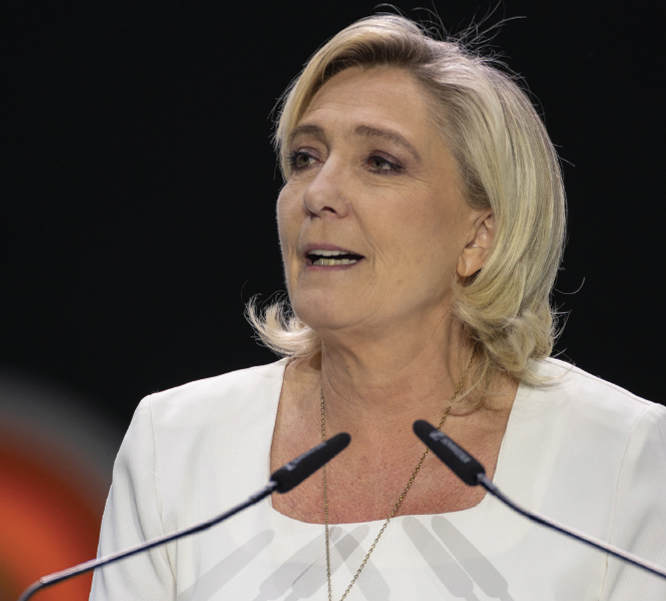
Scaremongering about a so-called left threat failed to panic French voters. Instead, writes ROGER PEARCE, the majority set aside their differences, voting against Le Pen’s toxic xenophobia and so stopping her taking a step closer to the presidency
As part of her effort to disguise a reinvention of French fascism, Marine Le Pen renamed the National Front (FN) as the National Rally (Rassemblement National, RN) in 2018, but after six years of her strategy of dédiabolisation (“de‑demonisation”) it was anti-fascists, in a historic parliamentary election on 7 July, who rallied to defeat her and very likely end her hopes of the presidency.
Following years of division, French democrats agreed to set aside their differences long enough to agree on the need to defeat Le Pen’s toxic xenophobia. And, within days of her defeat, Le Pen began dropping her mask of moderation, choosing to ally with a pro-Russian group in the European Parliament.
Le Pen started the election campaign by appearing to succeed in uniting the French far right, patching up a long-running family feud with her niece, Marion Maréchal. For several years, Maréchal has been French fascism’s ambassador to both the US new right and Russia’s Vladimir Putin autocracy. In February 2018, she was guest speaker at the Conservative Political Action Conference (CPAC), held in a Washington suburb, which brings together libertarians, Trumpists, big business and redneck David Duke fans.
In those days, CPAC’s organisers were able to claim that Maréchal represented a pro-business, “classical liberal” tendency inside the French right, in contrast to her aunt and what was then the FN, which had adopted a more traditional European statism.
This split seemed to harden at the end of 2021 when Maréchal allied with the Islamophobic journalist Éric Zemmour to form a new party, Reconquête, aiming to replace Le Pen’s RN as the main force on the French far right. Maréchal and Zemmour were eager for their new party to become Putin’s closest French allies. Just before her visit to Washington in 2018, Maréchal and other FN dissidents created ISSEP, a private university in Lyon. She set out to build close connections between ISSEP and Russia, visiting St Petersburg University and appointing pro-Putin lecturers.
She also recruited prominent figures in the Anglo-American far right, including Paul Gottfried (once a regular speaker for US racist organisations such as Jared Taylor’s American Renaissance and Peter Brimelow’s VDARE), and Raheem Kassam, former senior adviser to Nigel Farage.
Opportunist pacts
Although Reconquête had run out of steam by the time this year’s elections were called, Le Pen realised that her niece had greater appeal than she had to middle and upper-middle class voters.
At the start of the election campaign, Le Pen seemed to be justifying an old‑fashioned Marxist analysis of fascism. In defence of their wealth and privileges, the French bourgeoisie seemed prepared to hold their noses and vote for the type of crude xenophobia they might pretend to deplore at Parisian dinner tables.
And for a few weeks the house journals of supposedly “liberal” middle class Europeans and Americans seemed to be rallying round: perhaps Le Pen was not so bad compared with the “threat” of left‑wing tax rises? Perhaps we should all just ignore her political heritage, turn a blind eye and a deaf ear to her toxic rhetoric, and see her as just another conservative?
Le Pen took two important steps towards sealing this deal. First, she dealt a terminal blow to Reconquête, tempting Maréchal and others back into alliance with the RN and leaving Zemmour isolated. Then she encouraged a split in the main French conservative party, which in recent years has been called the Republicans.
Their leader, Éric Ciotti, took his followers into a pact with RN. The Republican organisation was left in confusion, with the anti-Ciotti faction, who wanted to maintain a conservative party untainted by fascism, for a time locked out of their own party offices. The courts eventually reinstated Ciotti as nominal leader of the Republicans, but it is only a matter of time before the party formally disintegrates.
Election shifts
French parliamentary elections are held in two rounds, and at the first round it seemed that Le Pen’s strategy was succeeding, building up expectations that the RN would at the very least be the largest party in the National Assembly and might even (helped by Maréchal, Ciotti and other new conservative allies) obtain a parliamentary majority.
Having stood down in several constituencies in each other’s favour, the RN won 37 seats outright in the first round, with one for its far-right conservative allies, winning more than 10.6 million votes (33.2%). This was an astonishing increase on the 4.2 million polled by the RN in 2022.
The remaining Reconquête candidates were now obviously irrelevant and took less than 1%.
However, it is important to remember the effect of different electoral systems: in the second round of the 2022 presidential election, when offered a direct choice between Emmanuel Macron and Le Pen, 13.3 million French voters backed Le Pen versus 18.8 million backing Macron.
Under the French system, any candidate whose first-round support totals more than 12.5% of the electorate, can stand in the second round, which means that second rounds can include three or even four candidates. This year, Le Pen was counting on hostility between President Macron’s liberal centrists and the notoriously divided French left.
What she did not expect was that personal ambition and factional differences would be set aside, in the most successful anti-fascist electoral mobilisation Europe has seen. Socialist and green factions had already united in the first round under the apt title New Popular Front, and won 32 seats in that round, polling 28.2%.
But most observers (and certainly Le Pen and her “Prime Minister-designate” Jordan Bardella) thought it would be impossible for the New Popular Front to reach agreement with the President’s party Ensemble.
Le Pen counted on Ensemble and either the left or green candidates standing against each other in the second round, or on their respective voters abstaining in large numbers. Instead, there was a widespread anti-fascist electoral pact, and a high turnout, especially among young voters determined to stop Le Pen.
Where the anti-Pen candidate was from the left or greens, and even if the anti-fascist standard bearer was from the hardest of hard left factions, centrists rallied behind them, and vice versa.
The outcome was that Le Pen’s party won only 88 extra seats in the second round, with a further 16 for her conservative allies. Far from being the largest group in the new Assembly, the combined far right has 142 seats compared to 180 for the New Popular Front, 159 for Ensemble, and 39 for those Republicans who refused to follow their leader into a Faustian pact with fascism.
A further 57 seats are held by a variety of locally based independents and miscellaneous factions who refuse to ally formally with any of the main groups. But from the moment the exit poll was broadcast on the evening of 7 July, it was obvious that Le Pen and Bardella had been defeated.
Risky gamble
Exactly how France will be governed with this divided Assembly is not yet clear. Having won a great victory over fascism, all of the centrist, green and left factions have a continuing heavy responsibility.
But, despite their bold rhetoric, it seems obvious that Le Pen and her RN colleagues recognise that their strategy has failed. Whereas before the election it seemed possible that she would continue heading towards the mainstream right, and perhaps form a pact with Italy’s “post-fascist” Prime Minister Giorgia Meloni, Le Pen has instead taken the RN into the new “Patriots for Europe” group headed by the blatantly authoritarian and pro-Moscow Hungarian Prime Minister Viktor Orbán.
She is gambling on a Putin victory in Ukraine and on the collapse of Western European democracy. That gamble looks far more risky, now that a reinvigorated Democratic Party is rallying behind US presidential candidate Kamala Harris.
But French anti-fascists know that (so far) they have only won a partial victory, on which they must continue to build so that the Le Pen dynasty and its poisonous politics can be destroyed forever at the 2027 presidential election.
This article first appeared in the Summer 2024 issue of Searchlight
